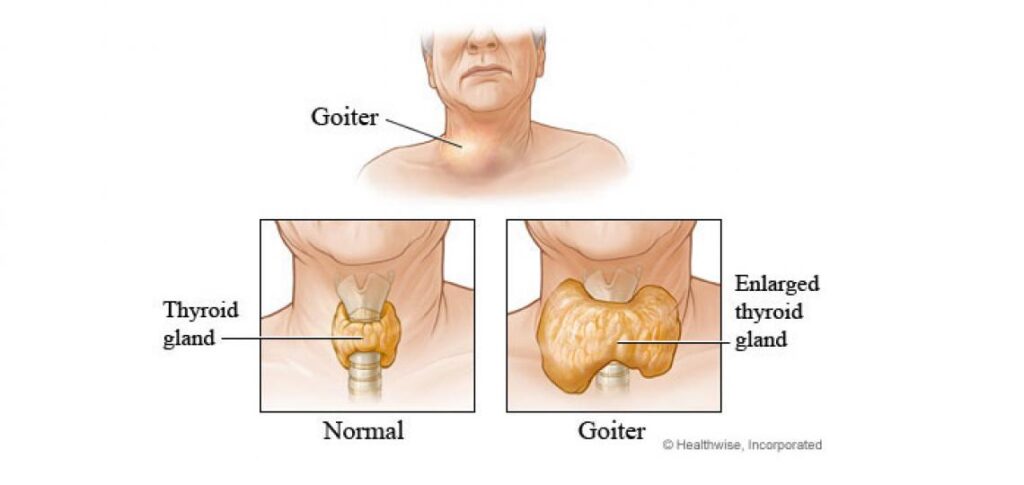Overview
Goiter is an abnormal enlargement of the thyroid gland. The thyroid is a butterfly-shaped gland located at the base of the neck just below the Adam’s apple. Although goiters are usually painless, a large goiter can cause a cough and make it difficult to swallow or breathe.
The most common cause of goiters worldwide is a lack of iodine in the diet. Another reason can be the over- or underproduction of thyroid hormones.

Causes
The thyroid gland produces two main hormones — thyroxine (T-4) and triiodothyronine (T-3). These hormones circulate in the bloodstream and help regulate metabolism. They maintain the rate at which the body uses fats and carbohydrates, help control body temperature, influence heart rate, and help regulate the production of proteins.
The thyroid gland also produces calcitonin — a hormone that helps regulate the amount of calcium in blood.
Pituitary gland and hypothalamus control the rate at which T-4 and T-3 are produced and released.
The hypothalamus signals your pituitary gland to make a hormone known as thyroid-stimulating hormone (TSH). The pituitary gland releases a certain amount of TSH, depending on how much thyroxine and T-3 are in the blood. The thyroid gland, in turn, regulates its production of hormones based on the amount of TSH it receives from the pituitary gland.
Complications
Small goiters that don’t cause physical or cosmetic problems aren’t a concern. But large goiters can make it hard to breathe or swallow and can cause a cough and hoarseness.
Goiters that result from other conditions, such as hypothyroidism or hyperthyroidism, may be associated with a number of symptoms, ranging from fatigue and weight gain to unintended weight loss, irritability and trouble sleeping.
Symptoms
- A swelling at the base of your neck that may be particularly obvious when you shave or put on makeup
- A tight feeling in your throat
- Coughing
- Hoarseness
- Difficulty swallowing
- Difficulty breathing
Treatment
- Medications. If you have hypothyroidism, thyroid hormone replacement with levothyroxine will resolve the symptoms of hypothyroidism as well as slow the release of TSH from the pituitary gland, often decreasing the size of the goiter. If you have a goiter that is associated with hyperthyroidism, you may need medications to normalize hormone levels.
- Surgery. Removing all or part of the thyroid gland (total or partial thyroidectomy) is an option if large goiter is uncomfortable or causes difficulty breathing or swallowing, or in some cases, if you have a nodular goiter causing hyperthyroidism. Surgery is also the treatment for thyroid cancer.
- Radioactive iodine. In some cases, radioactive iodine is used to treat an overactive thyroid gland. The radioactive iodine is taken orally and reaches your thyroid gland through your bloodstream, destroying thyroid cells. The treatment results in a diminished size of the goiter, but eventually may also cause an underactive thyroid gland.
Reference:
https://www.mayoclinic.org/diseases-conditions/goiter/symptoms-causes/syc-20351829
1 thought on “Goiter”